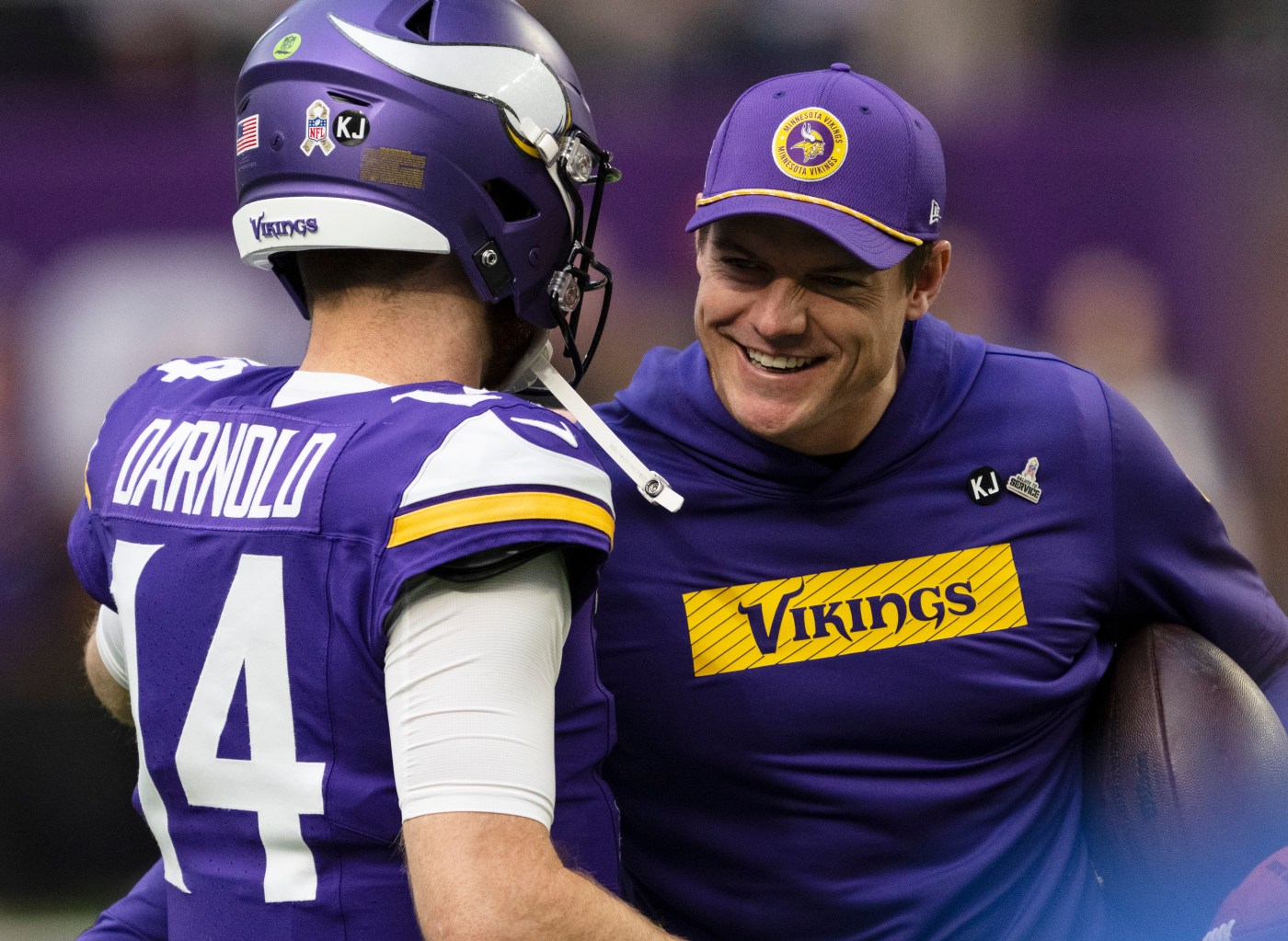
Dane Mizutani: Why breaking up with Kirk Cousins was the right move for Vikings
The fear of the unknown is something that often paralyzes teams across the NFL, especially when it comes to the most important position in sports.
Yet there the Vikings were at the start of free agency in the spring, jumping out of the airplane and pulling the ripcord on the parachute, watching their former franchise quarterback Kirk Cousins fly on without them.
Though the Vikings made what they felt was a fair offer to Cousins, who was still recovering from a torn Achilles tendon, nobody could could compete with the Atlanta Falcons coming to the table with a 4-year, $180 million contract.
That was the first domino to fall nearly 10 months ago, and it set off a chain reaction for both teams that will finally culminate on Sunday afternoon at U.S. Bank Stadium, when the Vikings host the Falcons in a noon kickoff.
The backdrop is befitting of the person at the epicenter of it all.
You’ve got the Vikings, who decided to move on from Cousins, contending for the NFC North title with a 10-2 record, and the Falcons, who decided to join forces with Cousins, free falling in the NFC South with a 6-6 record.
Never mind that pretty much everybody involved has tried to downplay the elephant in the room this week whenever it has come up. You know deep down, the Vikings want to stick it to Cousins, and he wants to do the same to them.
Who doesn’t want to win a breakup?
The marriage
When the Vikings made the decision to sign Cousins to a fully guaranteed 3-year, $84 million contract on March 15, 2018, they did so believing he could be the savior to take them to the promised land.
After reaching the NFC Championship Game with journeyman quarterback Case Keenum at the helm, the Vikings believed Cousins was the final piece of the puzzle in their endless pursuit of their first Super Bowl appearance since 1977.
Not only did Cousins fail to deliver, he never came close. His tenure with the Vikings amounted to a single playoff win, an upset of the New Orleans Saints that was immediately followed by a beatdown at the hands of the San Francisco 49ers.
There were highs and lows along the way for Cousins, despite the fact that the the Vikings consistently lived life in the mushy middle, good enough to compete for the playoffs, not good enough to being taken seriously as a Super Bowl contender.
After butting heads with former head coach Mike Zimmer during their time together, Cousins started to feel comfortable in his own skin under head coach Kevin O’Connell.
He leaned into the Kirko Chainz persona in a way that organically made him relatable to the masses. He became a fan favorite after the Netflix series “Quarterback” provided a peek behind the curtain. He started to look like a player who could take the Vikings wherever they wanted to go.
Yet the defining moment in Minnesota will forever be when Cousins turned into a puddle in the playoffs with the Vikings trying to mount a comeback against the New York Giants. Instead giving star receiver Justin Jefferson a chance downfield with the game on the line, Cousins checked down to tight end T.J. Hockenson short of the sticks for what resulted in a turnover on downs.
The decision to play it safe rather than let it rip was Cousins at his core.
Just when it looked as if Cousins had taken another step forward last season, he crumbled to the turf with the Vikings playing the Green Bay Packers at Lambeau Field. That proved to be the beginning of the end; Cousins never took another snap for the Vikings.
The divorce
It’s not a coincidence that the Vikings went on a spending spree as soon as Cousins agreed to terms with the Falcons. Suddenly, they had financial flexibility that never existed while Cousins was eating up a significant portion of the salary cap.
On March 11, in rapid succession, the Vikings agreed to terms with defensive veterans making big plays for them this season: edge rusher Jonathan Greenard, who signed a 4-year, $76 million contract; edge rusher Andrew Van Ginkel, who signed a 2-year, $20 million contract; and linebacker Blake Cashman, who signed a 3-year, $22.5 million contract.
To say that trio has been instrumental for defensive coordinator Brian Flores this season would be an understatement. Together, Greenard and Van Ginkel have wreaked havoc pressuring the passer, while Cashman has been the main communicator that makes sure everything runs smoothly throughout the game.
It wouldn’t have been possible for the Vikings to add that type of talent if they paid Cousins.
Though some apologists will suggest the Vikings technically could have afforded Greenard, Van Ginkel, and Cashman this season with Cousins on the roster, jumping through the required hoops to make the money work would have hamstrung the franchise for the foreseeable future.
It wasn’t long after Cousins made his decision that the Vikings found his replacement. On March 12, they agreed to terms with journeyman quarterback Sam Darnold. It couldn’t have worked out better for the Vikings.
You could make a legitimate argument that Darnold, who signed a 1-year, $10 million contract, has been straight up better than Cousins based on how both players have performed for their respective teams.
Whether the Vikings decide to run it back with Darnold or hand the keys to rookie quarterback J.J. McCarthy next season, they are on an upward trajectory this season and beyond, largely because they were brave enough to let Cousins leave.
That will be continue to be true regardless of what happens when the Vikings host the Falcons.
Related Articles
The Loop NFL Picks: Week 14
Vikings edge rusher Jonathan Greenard finally getting recognition he deserves
Vikings fullback C.J. Ham is nominee for Walter Payton Man of the Year Award
Now with the Falcons, former Vikings quarterback Kirk Cousins has to pick himself up off the mat once again
The toughest critic for Vikings running back Aaron Jones? His mom Vurgess.


